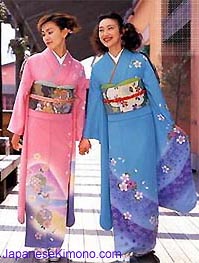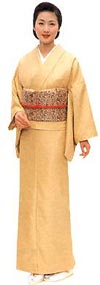|
Home
Kimono
Kimono History
Japanese Clothing
Kimono Fabric,
Kimono Pattern &
How to Make a Kimono
Kimono
Patterns & Kimono Styles
How to Wear a Kimono
Japanese Obi
& How to Tie an Obi Sash
Japanese
Yukata
- The Summer Kimono
Kimono
Robe & Japanese Robes
How to wear a Kimono Robe and Japanese Robes
Men's Kimono
Hakama
Pants
Japanese
Shoes & Japanese Sandal Types
Geta Sandals
Zori
Sandals & Tatami Sandals
Tabi Socks
Children's
Kimono
Wedding
Kimono
Happi
Coats & Japanese Festival Clothing
Favorite Links
& Sources
|
Kimono Patterns
- Kimono Styles

Kimono Patterns
Japanese kimono much like U.S. clothing are worn to compliment the seasons. In
the spring, bright colors and spring floral kimono patterns are worn. In autumn, fall colors
and fall kimono patterns are worn. In the winter, especially near the holidays,
kimono patterns with designs such as the bamboo, pine trees or plum blossoms or worn for they
signify good luck and prosperity.
Customarily, woven kimono patterns, dyed clothing and repetitive patterns are considered
informal. Formal kimono have free-style designs dyed over the whole
surface or along the hem. Originally, the kimono was worn in multiple
layers of different colors. Up to a dozen or more colorful layers of
contrasting colored kimono would be worn. Today, the kimono is normally
worn with a single layer on top of a slip style undergarment called
juban.
 Kimono
Styles Kimono
Styles
There
are many types of kimono, each worn according to the persons age, season
or the event. However, the formal kimono can be basically broken down
into two main categories based on the persons age and marital status.
Young unmarried women wear kimono with long sleeves called furisode.
The sleeve length can vary from slightly long to very long reaching the
ankle. Young women's kimono are very vibrant, colorful and rich with
patterns.
 Older
women or those who have married, wear a kimono with short sleeves called
tomesode. The kimono designs are smaller or solid and the colors
are more subdued. There are also special kimono made for ceremonies and
paying respect called the tsukesage, komon and the homongi. Older
women or those who have married, wear a kimono with short sleeves called
tomesode. The kimono designs are smaller or solid and the colors
are more subdued. There are also special kimono made for ceremonies and
paying respect called the tsukesage, komon and the homongi.
Today, kimono producers and designers have modernized the kimono to
meet the consumers everyday demands, economics and life style. New
kimono patterns, designs, colors and fabrics are made to be
"generic" to the persons age or marital status, thus being
much more versatile.
 NEXT NEXT
|

 Kimono
Styles
Kimono
Styles Older
women or those who have married, wear a kimono with short sleeves called
tomesode. The kimono designs are smaller or solid and the colors
are more subdued. There are also special kimono made for ceremonies and
paying respect called the tsukesage, komon and the homongi.
Older
women or those who have married, wear a kimono with short sleeves called
tomesode. The kimono designs are smaller or solid and the colors
are more subdued. There are also special kimono made for ceremonies and
paying respect called the tsukesage, komon and the homongi. 